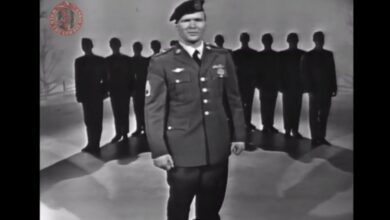As he begins the third verse, the most exquisite sound emerges, pure and divine.
Elvis Presley’s live rendition of “Never Been To Spain” during his iconic 1972 Las Vegas shows exemplifies his unmatched talent for enchanting audiences with both his vocal prowess and charismatic presence. This version of the song, originally penned by Hoyt Axton, captures themes of longing and the quest for adventure—emotions that Elvis expresses with remarkable intensity. The performance features a complex arrangement enriched by vibrant rhythms and soulful horn accents, which amplify the emotional impact of the lyrics. Through his interpretation, Elvis transforms the song into a joyous celebration of life’s possibilities and dreams, creating an exhilarating experience that resonated long after the final notes faded.
Elvis’s ability to blend diverse musical styles shines through in his performance of “Never Been To Spain,” showcasing an energetic combination of rock and roll, rhythm and blues, and gospel influences. This eclectic mix reflects his broader musical journey and ongoing evolution as an artist. Each note he sings navigates the emotional landscape of the song, unveiling layers of yearning, reflection, and delight. His heartfelt vocal delivery creates an intimate connection, allowing the audience to engage with the song’s narrative. By inviting listeners into this exploration of life’s complexities, Elvis cultivates a shared experience, making everyone feel engaged and connected.
The spontaneous interactions between Elvis and his audience further enhance the enchantment of his Las Vegas performances. He had a remarkable talent for tuning into the crowd’s energy, responding with a smile, a wink, or a playful remark. This organic rapport transforms the concert from a simple performance into a communal event. Fans, captivated by his dynamic stage presence, often felt as though they were part of an exclusive fellowship, bonded by their admiration for the King of Rock and Roll. These moments illuminate why Elvis’s concerts are celebrated as transformative experiences, providing an escape from the mundane and inviting audiences to lose themselves in the joy of music and the shared connection of being truly present.
Las Vegas, a city renowned for its opulence and entertainment, served as the perfect backdrop for Elvis’s artistic expression during this time. With its vibrant nightlife and diverse entertainment offerings, the city became a crucial element of Elvis’s legacy as he commanded the stages of its famous venues. His shows featured impressive set designs, talented backup musicians, and magnetic choreography, resulting in a theatrical experience that enthralled both locals and tourists. “Never Been To Spain” seamlessly fits into this broader artistic tapestry, showcasing his ability to combine music and spectacle, fostering both individuality and camaraderie among concertgoers.
Elvis’s remarkable talent for reinterpreting songs is a defining feature of his artistry, distinguishing him from his contemporaries and ensuring his lasting relevance in music. His inflection of “Never Been To Spain” with his signature style exemplifies his skill in revitalizing familiar melodies. His interpretations often resonate personally, allowing audiences to connect their own experiences to the music. This creative genius empowered him to remain a vital figure in the evolving landscape of popular music, constantly pushing the boundaries of genre and style.
Born on January 8, 1935, in Tupelo, Mississippi, Elvis Presley was raised amidst rich musical influences—from gospel hymns in church to the blues resonating from nearby juke joints. His modest beginnings contrast sharply with his meteoric rise to fame, where his unique voice and style captured attention early on. By the 1950s, he had become a household name, producing hits that defined an era. His music not only revolutionized rock and roll but also played a significant role in breaking down cultural barriers, paving the way for future generations of artists across various genres.
In addition to his illustrious music career, Elvis made significant contributions to film, starring in several successful movies that showcased his extraordinary talent. Films like “Viva Las Vegas” and “Jailhouse Rock” highlighted not only his musical abilities but also his undeniable charisma as a leading man. Through cinema, he reached an even wider audience, solidifying his status as a multifaceted entertainer. The crossover appeal evident in his films allowed fans from different backgrounds to engage with his artistry, broadening his influence and securing his place in cultural history.
As the 1970s unfolded, Elvis confronted various challenges and transformations in his personal and professional life. Yet, his performances continued to resonate with audiences, reflecting the changing times. By the time of his legendary Las Vegas residencies, he had transitioned into a role that combined nostalgia with respect as an elder statesman of rock and roll. Through “Never Been To Spain,” he encouraged fans to reflect on his journey while also embracing new experiences, transcending time and connecting generations.
Elvis Presley’s profound influence on music and culture is undeniable, as showcased in his performance of “Never Been To Spain.” This rendition exemplifies not just his extraordinary vocal talent, but also his gift for forging emotional connections with audiences. His artistry goes beyond mere entertainment; it serves as a deeper exploration of human experiences such as love, longing, and the pursuit of connectedness. The depth and palpable energy of his live shows continue to inspire aspiring artists, serving as benchmarks for that vital performer-audience relationship.
In summary, the 1972 performance of “Never Been To Spain” encapsulates the essence of Elvis Presley as both a musician and a cultural icon. His legacy, imbued with themes of adventure and emotional depth, invites listeners to reflect on their own life journeys. Elvis’s music remains a reminder of the universal themes that unite humanity, ensuring his influence endures in contemporary culture and inspiring future generations to pursue authenticity and connection through artistry.





